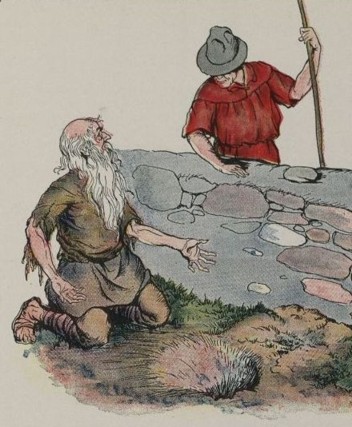PART A_1
Let’s learn vocabulary. Listen and repeat the words and the sentences with your tutor.
PART A_2
| 1. miser | /MAHY-zer/ |
| -someone who has a strong wish to have money and hates to spend it | |
| There is a myth that living like a miser will see you end up with a stash of gold. | |
| 2. overcome | /oh-ver-KUHM/ |
| -to defeat or succeed in dealing with something | |
| She had overcome her struggles silently. | |
| 3. groan | /grohn/ |
| -a deep, long sound showing great pain or sadness | |
| “My wound hurts!” he groaned. | |
| 4. passerby | /PAS-er-BAHY/ |
| -someone who is going past a particular place | |
| The passersby are staring at the arguing couple. | |
| 5. possession | /puh-ZESH-uhn/ |
| -something that you own or that you are carrying with you at a particular time | |
| Emma packed all her possessions into her car. |
PART B_1
Let’s read the story. Please read them aloud, and I will check your pronunciation and intonation.
PART B_2
The Miser

A Miser had buried his gold in a secret place in his garden. Every day he went to the spot, dug up the treasure and counted it piece by piece to make sure it was all there. He made so many trips that a Thief, who had been observing him, guessed what it was the Miser had hidden, and one night quietly dug up the treasure and made off with it.
When the Miser discovered his loss, he was overcome with grief and despair. He groaned and cried and tore his hair.
A passerby heard his cries and asked what had happened.
“My gold! O my gold!” cried the Miser, wildly, “someone has robbed me!”
“Your gold! There in that hole? Why did you put it there? Why did you not keep it in the house where you could easily get it when you had to buy things?”
“Buy!” screamed the Miser angrily. “Why, I never touched the gold. I couldn’t think of spending any of it.”
The stranger picked up a large stone and threw it into the hole.
“If that is the case,” he said, “cover up that stone. It is worth just as much to you as the treasure you lost!”
A possession is worth no more than the use we make of it.
PART C_1
Let’s answer comprehension questions. Please answer them based on the story.
PART C_2
| 1. | Where did the Miser bury his gold? |
| 2. | How did the Thief guess what the Miser had hidden in the hole? |
| 3. | What did the stranger tell the Miser after throwing the stone in the hole? |
PART D_1
Let’s discuss the story. Please answer the questions below and express your opinions.
PART D_2
| 1. | If you were the Miser, would you also bury your gold? Why or why not? |
| 2. | How do you value and protect your possessions? |
| 3. | Do you believe that wealth unused might as well not exist? Why or why not? |
| 4. | What is your understanding of the fable’s lesson? |
| 5. | Give a situation similar to the fable’s lesson. |
REVIEW AND FEEDBACK
Now, let us review the things that you learned in this lesson.
ではこのレッスンで学んだことを振り返りましょう。
(Please give a short feedback on how your student did on your class.)
| Grammar 文法 |
Pronunciation 発音 | Vocabulary 単語 |
Comprehension 理解 |
|
|---|---|---|---|---|
 GOOD GOOD |
文法の誤りはほとんどなく、完全な文章で話すことができる | ほとんどの単語をはっきりと正しく発音することができる | 習った表現を適切に使うことができる | 文章を理解し、質問に正しく答えることができる |
 FAIR |
文法の誤りはあるが、完全な文章で話すことができる | 発音の練習が必要な言葉がいくつかある | たまにミスはあるが、習った表現を適切に使うことができる | 文章を完全に理解するのは難しく、質問に正しく答えられないときもある |
 POOR |
文章で話すのは難しく、単語だけで話すことができる | 発音の練習が必要である | 習った単語と表現を少しだけ使うことができる | 文章を理解するのは難しく、質問に答えるのは難しい |
Parts of this lesson material are based on:
An eBook from The Project Gutenberg.
This eBook is for the use of anyone anywhere at no cost and with almost no restrictions whatsoever. You may copy it, give it away or re-use it under the terms of the Project Gutenberg License included with this eBook or online at www.gutenberg.org
An eBook from The Project Gutenberg.
This eBook is for the use of anyone anywhere at no cost and with almost no restrictions whatsoever. You may copy it, give it away or re-use it under the terms of the Project Gutenberg License included with this eBook or online at www.gutenberg.org